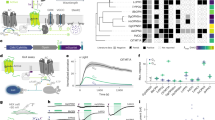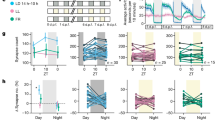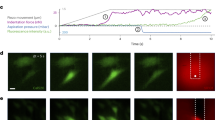Abstract
THE response of cells to hormones and neurotransmitters is mediated by chemical regulators, of which calcium, adenosine cyclic 3′,5′-monophosphate (cyclic AMP) and guanosine cyclic 3′,5′-monophosphate (cyclic GMP) are considered to be of primary importance. The endogenous occurrence of cyclic GMP was discovered more than 10yr ago, but until recently its formation has been reported chiefly in association with the activation of cholinergic muscarinic receptors1,2. The description in the pancreas of a cyclic GMP-dependent protein kinase3, a cyclic GMP phospho-diesterase4, and the ability in vivo of cholecystokinin to increase cyclic GMP levels5, suggested a physiological role for cyclic GMP in the mediation of hormone action. We report here experiments on isolated guinea pig pancreatic slices, in which the hormone cholecystokinin (CCK) and the neurotransmitter acetylcholine (ACh) both produced a marked, transient increase in the tissue level of cyclic GMP, which preceded the release of secretory enzymes. Exposure of the isolated pancreatic slices to the hormone secretin evoked a more prolonged increase in cyclic AMP, without any significant effect on cyclic GMP.
This is a preview of subscription content, access via your institution
Access options
Subscribe to this journal
Receive 51 print issues and online access
$199.00 per year
only $3.90 per issue
Buy this article
- Purchase on Springer Link
- Instant access to full article PDF
Prices may be subject to local taxes which are calculated during checkout
Similar content being viewed by others
References
George, W. J., Polson, J. B., O'Toole, A. G., and Goldberg, N. D., Proc. natn. Acad. Sci. U.S.A., 66, 398–403 (1970).
Schultz, G., and Hardman, J. G., Adv. Cyclic Nucleotide Res., 5, 339–352 (1975).
Van-Leemput-Coutrez, N., Camus, J., and Christophe, J., Biochem. biophys. Res. Commun., 54, 182–190 (1973).
Robberecht, P., Deschodt-Lanckman, M., De Neef, P., and Christophe, J., Eur. J. Biochem., 41, 585–591 (1974).
Robberecht, P., Deschodt-Lanckman, M., De Neef, P., Borgeat, P., and Christope, J., FEBS Lett., 43, 129–142 (1974).
Brown, B. L., Albano, J. D. M., Ekins, R. P., Sgherzi, A. M., and Tampion, W., Biochem J., 121, 561–562 (1971).
Albano, J. D. M., Barnes, G. D., Maudsley, D. V., Brown, B. L., and Ekins, R. P., Analyt. Biochem., 60, 130–141 (1974).
Steiner, A. L., Parker, C. W., and Kipnis, D. M., J. biol. Chem., 247, 1106–1113 (1972).
Bhoola, K. D., Dorey, G., and Jones, C. W., J. Physiol., Lond., 235, 503–522 (1973).
Lemon, M. J. C., and Bhoola, K. D., Biochim. biophys. Acta, 385, 101–113 (1975).
Author information
Authors and Affiliations
Rights and permissions
About this article
Cite this article
ALBANO, J., BHOOLA, K. & HARVEY, R. Intracellular messenger role of cyclic GMP in exocrine pancreas. Nature 262, 404–406 (1976). https://doi.org/10.1038/262404a0
Received:
Accepted:
Published:
Issue Date:
DOI: https://doi.org/10.1038/262404a0
This article is cited by
-
Increased intracellular cyclic GMP does not correlate with protein discharge from pancreatic acinar cells
Nature (1979)
-
Biochemical basis of action of gastrointestinal hormones
World Journal of Surgery (1979)
Comments
By submitting a comment you agree to abide by our Terms and Community Guidelines. If you find something abusive or that does not comply with our terms or guidelines please flag it as inappropriate.



